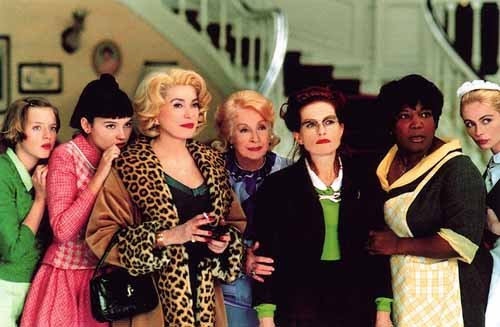TRISTANA (Luis Buñuel, 1970)
Film Society of Lincoln Center
Walter Reade Theater
165 West 65th St. at Amsterdam Ave.
Saturday, December 15, 5:30
Series continues through December 16
212-875-5601
www.filmlinc.com
 Luis Buñuel’s adaptation of Benito Pérez Galdós’s 1892 novel Tristana is an often underrated, deceivingly wicked psychological black comedy. A dubbed Catherine Deneuve stars as the title character, a shy, virginal young orphan employed in the household of the aristocratic, atheist Don Lope (Fernando Rey), an avowed atheist and aging nobleman who regularly spouts off about religion and the wretched social conditions in Spain (where the Spanish auteur had recently returned following many years living and working in Mexico). Soon Don Lope is serving as both husband and father to Tristana, who allows the world to pile its ills on her without reacting — until she meets handsome artist Horacio (Franco Nero) and begins to take matters into her own hands, with tragic results. Although Tristana is one of Buñuel’s more straightforward offerings with regard to narrative, featuring fewer surreal flourishes, it is a fascinating exploration of love, femininity, wealth, power, and a changing of the old guard. Deneuve is magnetic as Tristana, transforming from a meek, naive, gorgeous girl into a much stronger, and ultimately darker, gorgeous woman. Lola Gaos provides solid support as Saturna, who runs Don Lope’s household with a firm hand while also taking care of her deaf son, Saturno (Jesús Fernández), yet another male who is fond of the beautiful Tristana. The film is one of Buñuel’s most colorful works, wonderfully shot by cinematographer José F. Aguayo, who photographed Buñuel’s 1961 masterpiece Viridiana, which was also based on a novel by Galdós and starred Rey. Tristana is screening December 15 at 5:30 as part of the Buñuel sidebar at the Film Society of Lincoln Center’s “Spanish Cinema Now” series, which continues through December 16 with such other films as Pedro Pérez Rosado’s Wilaya, Alvaro Longoria’s Sons of the Clouds, and Viridiana.
Luis Buñuel’s adaptation of Benito Pérez Galdós’s 1892 novel Tristana is an often underrated, deceivingly wicked psychological black comedy. A dubbed Catherine Deneuve stars as the title character, a shy, virginal young orphan employed in the household of the aristocratic, atheist Don Lope (Fernando Rey), an avowed atheist and aging nobleman who regularly spouts off about religion and the wretched social conditions in Spain (where the Spanish auteur had recently returned following many years living and working in Mexico). Soon Don Lope is serving as both husband and father to Tristana, who allows the world to pile its ills on her without reacting — until she meets handsome artist Horacio (Franco Nero) and begins to take matters into her own hands, with tragic results. Although Tristana is one of Buñuel’s more straightforward offerings with regard to narrative, featuring fewer surreal flourishes, it is a fascinating exploration of love, femininity, wealth, power, and a changing of the old guard. Deneuve is magnetic as Tristana, transforming from a meek, naive, gorgeous girl into a much stronger, and ultimately darker, gorgeous woman. Lola Gaos provides solid support as Saturna, who runs Don Lope’s household with a firm hand while also taking care of her deaf son, Saturno (Jesús Fernández), yet another male who is fond of the beautiful Tristana. The film is one of Buñuel’s most colorful works, wonderfully shot by cinematographer José F. Aguayo, who photographed Buñuel’s 1961 masterpiece Viridiana, which was also based on a novel by Galdós and starred Rey. Tristana is screening December 15 at 5:30 as part of the Buñuel sidebar at the Film Society of Lincoln Center’s “Spanish Cinema Now” series, which continues through December 16 with such other films as Pedro Pérez Rosado’s Wilaya, Alvaro Longoria’s Sons of the Clouds, and Viridiana.
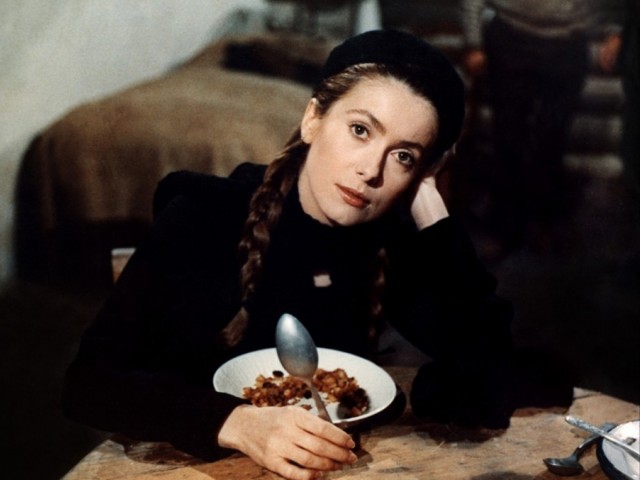
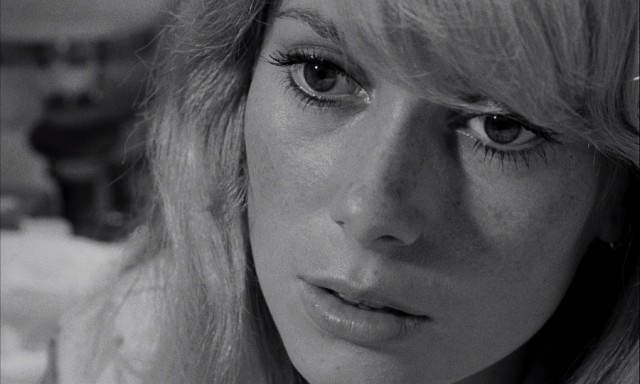
 If you think Lower Manhattan was scary this last week while the power was out, just wait till you see Roman Polanski’s first English-language film, the 1965 psychological masterpiece Repulsion. Catherine Deneuve gives a mesmerizing performance as Carol Ledoux, a deeply troubled, beautiful young woman who shies away from the world, hiding something that has turned her into a frightened childlike creature who barely speaks. A manicurist who lives in London with her sister, Hélène (Yvonne Furneaux), Carol becomes entranced by cracks in the sidewalk, suddenly going nearly catatonic at their sight; in bed at night, she is terrified of the walls, which seem to break apart as she grips tight to the covers. A proper gentleman (John Fraser) is trying to start a relationship with her, but she ignores him or forgets about their meetings, unable to make any genuine connections. Deneuve’s every movement, from the blink of an eye to a wave of her hand, reveals Carol’s submerged inner turmoil and desperation, leading to an ending that is both shocking and not surprising. Shot in a creepy black-and-white by Gilbert Taylor (A Hard Day’s Night, Dr. Strangelove or: How I Learned to Stop Worrying and Love the Bomb) and featuring a pulsating score by jazz legend Chico Hamilton, Repulsion is a brilliant journey into the limitations and possibilities of the human mind, with Polanski expertly navigating through a complex terrain. Winner of a pair of awards at the fifteenth Berlin International Film Festival, Repulsion, the first of Polanski’s Apartment Trilogy (followed by 1968’s Rosemary’s Baby and 1976’s The Tenant), will be screening in a new 35mm print November 3-8 at Film Forum, which is reopening this afternoon after having lost power because of Hurricane Sandy.
If you think Lower Manhattan was scary this last week while the power was out, just wait till you see Roman Polanski’s first English-language film, the 1965 psychological masterpiece Repulsion. Catherine Deneuve gives a mesmerizing performance as Carol Ledoux, a deeply troubled, beautiful young woman who shies away from the world, hiding something that has turned her into a frightened childlike creature who barely speaks. A manicurist who lives in London with her sister, Hélène (Yvonne Furneaux), Carol becomes entranced by cracks in the sidewalk, suddenly going nearly catatonic at their sight; in bed at night, she is terrified of the walls, which seem to break apart as she grips tight to the covers. A proper gentleman (John Fraser) is trying to start a relationship with her, but she ignores him or forgets about their meetings, unable to make any genuine connections. Deneuve’s every movement, from the blink of an eye to a wave of her hand, reveals Carol’s submerged inner turmoil and desperation, leading to an ending that is both shocking and not surprising. Shot in a creepy black-and-white by Gilbert Taylor (A Hard Day’s Night, Dr. Strangelove or: How I Learned to Stop Worrying and Love the Bomb) and featuring a pulsating score by jazz legend Chico Hamilton, Repulsion is a brilliant journey into the limitations and possibilities of the human mind, with Polanski expertly navigating through a complex terrain. Winner of a pair of awards at the fifteenth Berlin International Film Festival, Repulsion, the first of Polanski’s Apartment Trilogy (followed by 1968’s Rosemary’s Baby and 1976’s The Tenant), will be screening in a new 35mm print November 3-8 at Film Forum, which is reopening this afternoon after having lost power because of Hurricane Sandy.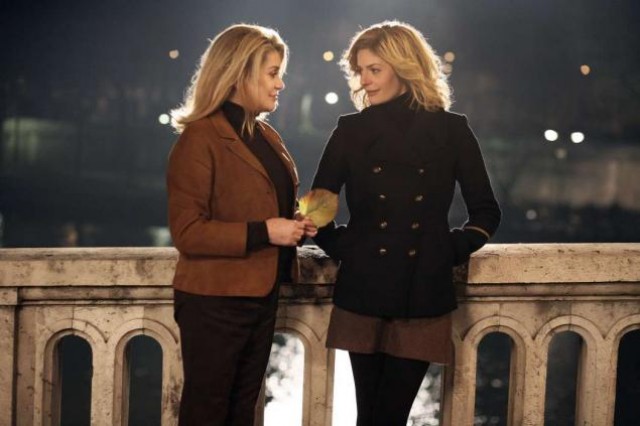
 The closing-night selection of the 2011 Cannes Film Festival, Christophe Honoré’s Beloved attempts to be a sweeping romantic epic, but it works best when it when it keeps it simple. In 1964 Paris, Madeleine (Ludivine Sagnier) decides that making a little extra money by selling her body is a better way to afford fancier things than by stealing them, until she falls for Czech doctor Jaromil (Rasha Bukvic). But after they have a child, Soviet tanks invade Prague, and Jaromil takes a lover, they separate. Over the years, as Madeleine (later played by Catherine Deneuve) tries to make a new life for her and Vera (Deneuve’s real-life daughter, Chiara Mastroianni), Jaromil (Czech director Milos Forman) keeps reappearing in their lives, but while Madeleine seems comfortable being with her former husband again, displaying a free and open sexuality, Vera seems unable to sustain a real relationship, adored by a younger teacher (Louis Garrel) while chasing after a gay American musician (Paul Schneider). A sort of mash-up of Luis Buñuel’s Belle de Jour and Jacques Demy’s The Umbrellas of Cherbourg, Beloved features characters calmly turning to song to contemplate their inner dilemmas as they walk through the streets, singing such numbers as “Heaven Knows I’m Miserable Now” (adapted from the Smiths’ original), then proceeding on. When Honoré (Love Songs, Dans Paris) keeps to the central plotlines, Beloved is an engaging, intimate look at sex, love, and family over a forty-five-year period. Unfortunately, he injects unnecessary sociopolitical elements that sidetrack the story and feel forced. At 135 minutes, the film is also at least a half hour too long. Had Honoré stopped earlier, he would have had quite a film, but instead it seems to go on interminably, passing up what could have been fine endings for additional scenes that quickly become tiresome and repetitive. Beloved does have its moments, but it sadly falls short of what it could have been. The director will be on hand at the IFC Center to discuss the film at the 6:55 screenings on Friday and Saturday night of opening weekend.
The closing-night selection of the 2011 Cannes Film Festival, Christophe Honoré’s Beloved attempts to be a sweeping romantic epic, but it works best when it when it keeps it simple. In 1964 Paris, Madeleine (Ludivine Sagnier) decides that making a little extra money by selling her body is a better way to afford fancier things than by stealing them, until she falls for Czech doctor Jaromil (Rasha Bukvic). But after they have a child, Soviet tanks invade Prague, and Jaromil takes a lover, they separate. Over the years, as Madeleine (later played by Catherine Deneuve) tries to make a new life for her and Vera (Deneuve’s real-life daughter, Chiara Mastroianni), Jaromil (Czech director Milos Forman) keeps reappearing in their lives, but while Madeleine seems comfortable being with her former husband again, displaying a free and open sexuality, Vera seems unable to sustain a real relationship, adored by a younger teacher (Louis Garrel) while chasing after a gay American musician (Paul Schneider). A sort of mash-up of Luis Buñuel’s Belle de Jour and Jacques Demy’s The Umbrellas of Cherbourg, Beloved features characters calmly turning to song to contemplate their inner dilemmas as they walk through the streets, singing such numbers as “Heaven Knows I’m Miserable Now” (adapted from the Smiths’ original), then proceeding on. When Honoré (Love Songs, Dans Paris) keeps to the central plotlines, Beloved is an engaging, intimate look at sex, love, and family over a forty-five-year period. Unfortunately, he injects unnecessary sociopolitical elements that sidetrack the story and feel forced. At 135 minutes, the film is also at least a half hour too long. Had Honoré stopped earlier, he would have had quite a film, but instead it seems to go on interminably, passing up what could have been fine endings for additional scenes that quickly become tiresome and repetitive. Beloved does have its moments, but it sadly falls short of what it could have been. The director will be on hand at the IFC Center to discuss the film at the 6:55 screenings on Friday and Saturday night of opening weekend.
 France’s official selection for the 2007 Academy Awards, Persepolis brings to animated life Marjane Satrapi’s stunning graphic novels. Codirected by Satrapi and comic-book artist Vincent Paronnaud, Persepolis tells Satrapi’s harrowing life story as she comes of age during the Islamic Revolution in Iran in the late 1970s and early 1980s. Raised in a well-off activist family, she fights against many of the country’s crippling mores and laws, particularly those that treat women as second-class citizens, trapping them in their veils, denying them any kind of individual freedom. But the progressive Satrapi (voiced first by Gabrielle Lopes, then Chiara Mastroianni) continually gets into trouble as she speaks her mind, experiments with sex, and refuses to play by her country’s repressive rules. Satrapi and Paronnaud do an outstanding job of adapting the books’ black-and-white panels for the big screen, maintaining her unique style and emotional breadth. The first part of the film is excellent as the precocious teenager who talks to God learns about life in some very harsh ways. Unfortunately, the second half gets bogged down in Satrapi’s failures as an adult, focusing too much on her myriad personal problems and taking away the bigger picture that made the first part so entertaining as well as educational. Still, it’s a story worth telling, and well worth seeing. (Interestingly, since the film, which is in French, is subtitled in English, the audience ends up reading it similarly to the way they read the graphic novel.) The closing-night selection of the 2007 New York Film Festival, Persepolis also features the voices of Catherine Deneuve as Marjane’s mother, Danielle Darrieux as her grandmother, Simon Akbarian as her father, and François Jerosme as her radical uncle Anouche. Persepolis is screening in Riverside Park on July 13 as part of the Films on the Green series, which concludes September 6 with François Truffaut’s Jules et Jim on the Low Library Steps at Columbia University.
France’s official selection for the 2007 Academy Awards, Persepolis brings to animated life Marjane Satrapi’s stunning graphic novels. Codirected by Satrapi and comic-book artist Vincent Paronnaud, Persepolis tells Satrapi’s harrowing life story as she comes of age during the Islamic Revolution in Iran in the late 1970s and early 1980s. Raised in a well-off activist family, she fights against many of the country’s crippling mores and laws, particularly those that treat women as second-class citizens, trapping them in their veils, denying them any kind of individual freedom. But the progressive Satrapi (voiced first by Gabrielle Lopes, then Chiara Mastroianni) continually gets into trouble as she speaks her mind, experiments with sex, and refuses to play by her country’s repressive rules. Satrapi and Paronnaud do an outstanding job of adapting the books’ black-and-white panels for the big screen, maintaining her unique style and emotional breadth. The first part of the film is excellent as the precocious teenager who talks to God learns about life in some very harsh ways. Unfortunately, the second half gets bogged down in Satrapi’s failures as an adult, focusing too much on her myriad personal problems and taking away the bigger picture that made the first part so entertaining as well as educational. Still, it’s a story worth telling, and well worth seeing. (Interestingly, since the film, which is in French, is subtitled in English, the audience ends up reading it similarly to the way they read the graphic novel.) The closing-night selection of the 2007 New York Film Festival, Persepolis also features the voices of Catherine Deneuve as Marjane’s mother, Danielle Darrieux as her grandmother, Simon Akbarian as her father, and François Jerosme as her radical uncle Anouche. Persepolis is screening in Riverside Park on July 13 as part of the Films on the Green series, which concludes September 6 with François Truffaut’s Jules et Jim on the Low Library Steps at Columbia University. 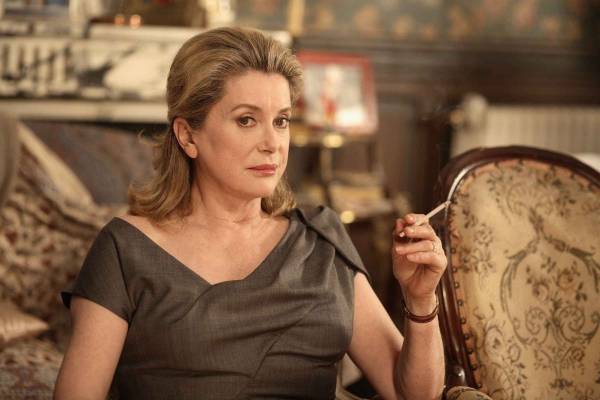
 One of the best films of 2008, A Christmas Tale (Un Conte de Noël) is yet another extraordinary work from French filmmaker Arnaud Desplechin (La Sentinelle, Esther Kahn). Desplechin, who examined family dysfunction in the masterful Kings and Queen (one of the best films of 2006), brings back much of that film’s cast in A Christmas Tale. Catherine Deneuve stars as Junon, the family matriarch who has just discovered she has leukemia and is in need of a bone-marrow transplant. Although it is rare for children to donate bone marrow to their mother (or grandmother), Junon insists that they all take the test to see if they are compatible. Soon they gather at Junon and Abel’s (Jean-Paul Roussilon) house for the holidays: oldest daughter Elizabeth (Anne Consigny), a dark and depressed woman whose teenage son, Paul (Emile Berling), has been institutionalized with mental problems and whose husband, Claude (Hippolyte Girardot), is rarely home; Ivan (Melvil Poupaud), the youngest son, a carefree sort married to Sylvia (Chiara Mastroianni, Deneuve’s real-life daughter), whom Junon strongly distrusts; and black sheep Henri (Mathieu Almaric), the middle child who was initially conceived primarily to save Abel and Junon’s first son, Joseph, who ended up dying of the same leukemia that Junon has contracted. Henri, who shows up with a new girlfriend, the very direct Faunia (Emmanuelle Devos), is a philandering ne’er-do-well who is deeply estranged from Elizabeth and not close with his mother, leading to much strife as Christmas — and a possible transplant — nears. Desplechin, who wrote the script with Emmanuel Bourdieu, once again has created powerful, realistic characters portrayed marvelously by his extremely talented cast; despite the family’s massive dysfunction, you’ll feel that even spending more than two and a half hours with them is not enough. A Christmas Tale concludes BAMcinématek’s month-long “Deneuve” series in high style.
One of the best films of 2008, A Christmas Tale (Un Conte de Noël) is yet another extraordinary work from French filmmaker Arnaud Desplechin (La Sentinelle, Esther Kahn). Desplechin, who examined family dysfunction in the masterful Kings and Queen (one of the best films of 2006), brings back much of that film’s cast in A Christmas Tale. Catherine Deneuve stars as Junon, the family matriarch who has just discovered she has leukemia and is in need of a bone-marrow transplant. Although it is rare for children to donate bone marrow to their mother (or grandmother), Junon insists that they all take the test to see if they are compatible. Soon they gather at Junon and Abel’s (Jean-Paul Roussilon) house for the holidays: oldest daughter Elizabeth (Anne Consigny), a dark and depressed woman whose teenage son, Paul (Emile Berling), has been institutionalized with mental problems and whose husband, Claude (Hippolyte Girardot), is rarely home; Ivan (Melvil Poupaud), the youngest son, a carefree sort married to Sylvia (Chiara Mastroianni, Deneuve’s real-life daughter), whom Junon strongly distrusts; and black sheep Henri (Mathieu Almaric), the middle child who was initially conceived primarily to save Abel and Junon’s first son, Joseph, who ended up dying of the same leukemia that Junon has contracted. Henri, who shows up with a new girlfriend, the very direct Faunia (Emmanuelle Devos), is a philandering ne’er-do-well who is deeply estranged from Elizabeth and not close with his mother, leading to much strife as Christmas — and a possible transplant — nears. Desplechin, who wrote the script with Emmanuel Bourdieu, once again has created powerful, realistic characters portrayed marvelously by his extremely talented cast; despite the family’s massive dysfunction, you’ll feel that even spending more than two and a half hours with them is not enough. A Christmas Tale concludes BAMcinématek’s month-long “Deneuve” series in high style.